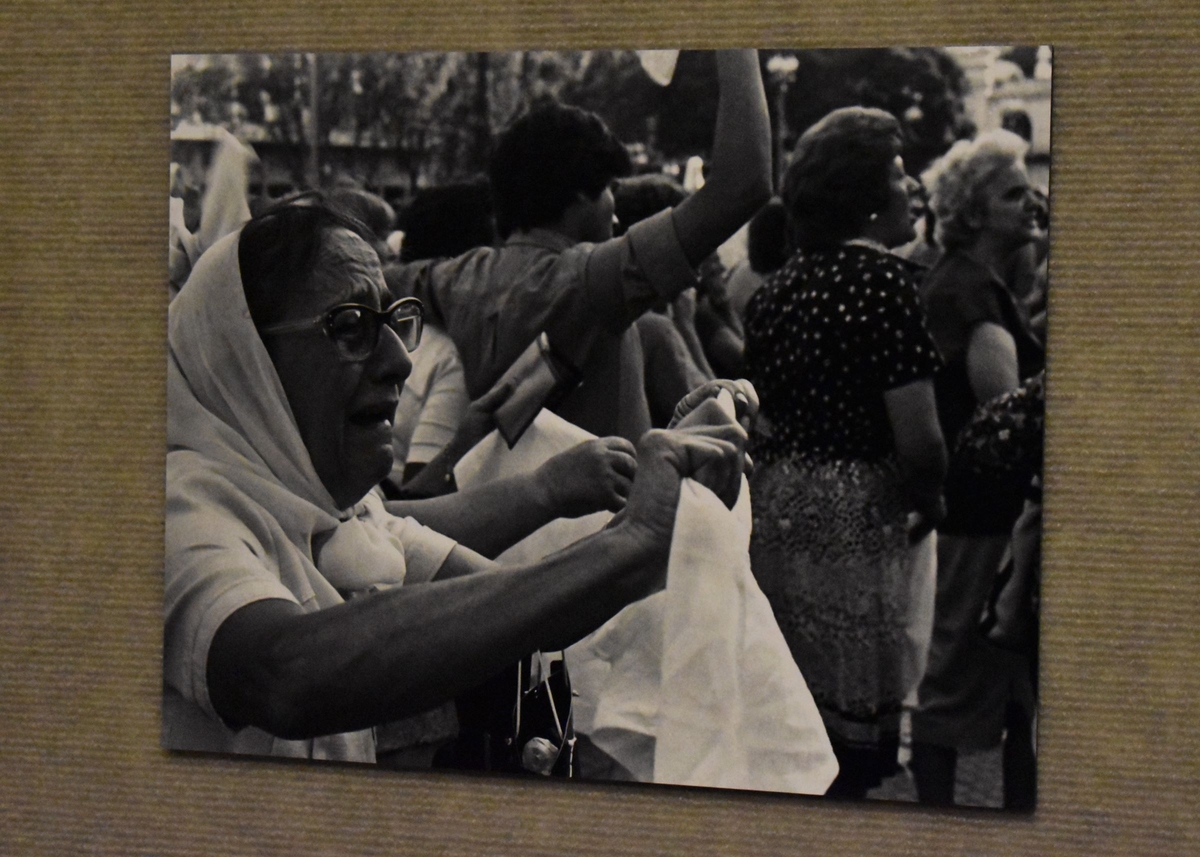
Karen Ponzio Photos
One of the photos of the Mothers of the Plaza de Mayo by Eduardo Longoni.
The Latino and Iberian Film Festival at Yale — a.k.a. LIFFY — commenced Monday night with a screening of the documentary film Una Mirada Honesta/An Honest Look, the story of Argentinian photographer Eduardo Longoni and his iconic images that changed history. It was a fitting way to begin the festival’s 14th year, as it has become known for its provocative and passionate presentation of films that open viewers’ eyes and hearts with stories often left untold elsewhere.

Programs for this year's festival
The festival runs through Nov. 5.
According to Margherita Tortora, senior lecturer in Spanish at Yale and executive director of the festival, the exhibition of photos and talk with Longoni held at the Yale Law School earlier in the day was “full.” She anticipated another year of exciting and important work to be shared all week, both virtually and in person and, of course, all free and open to the public (except for the student programming presented at Yale for high school students from New Haven and Old Lyme, and another closed presentation this year for the first time at East Haven High School, both for the film Croma Kid, from the Dominican Republic).
Films this year hail from such places as Spain, Puerto Rico, Cuba, Mexico, and Peru, and, as always, filmmakers are present from those places to discuss their work afterward at most of the in-person screenings, which will take place at 53 Wall Street, Luce Hall, and the Joseph Slifka Center for Jewish Life.
On Monday evening at 53 Wall St., a selection of Longoni’s iconic photographs were set up in the lobby for the audience to take in before and after the film, which was to be followed by a Q&A moderated by Tortora. Attendees were able to peruse the display and meet Longoni himself before the film began.

Longoni and Tortora
The 2022 documentary by Gato Martinez and Santiago Nacif, which begins with a quote from photographer Robert Capa — “If your pictures aren’t good enough, you’re not close enough” — traces the life of Longoni from a child who fell in love with the sea to a man who fell in love with photography, which he first came to as a job to help him pay for his studies and then turned into “the love of his life.”
Much of that life is seen in the photos of Longoni himself, taken by his mother, as well as the photos he has taken that have become indelible images in the hearts of Argentinians and others worldwide. The images of Longoni’s time on the streets, at the forefront of the violence that occurred during the time of the Jorge Rafael Videla dictatorship in Argentina, became historical markers as years went on. At the time they were taken, they were the only way some knew about such events occurring. His photos of the Mothers of the Plaza de Mayo — mothers of victims of the dictatorship who were “disappeared” — ended up being sent abroad and helped to end the dictatorship.
Throughout the touching and thought-provoking film, Longoni himself is seen revisiting and commenting on the moments he captured on film. At one point he says the photographer must have “patience … for being somewhere where nothing seems to happen … and patience for the process.”
There are personal moments connecting with his mother and daughter. There are connections with other creators as he works on an art installation that includes a Ford Falcon covered in one of his photos, as a three-dimensional way to convey how that car was used during the dictatorship as a “disappearance machine.”
And then there is a meditation on his love and coverage of soccer, which led to one of his most iconic photos: of Diego Maradona’s goal during the 1986 World Cup, called The Hand of God, which some have called “the perfect photo.” Longoni himself speaks throughout the film about his own experiences and photography itself.
“As photographers we try to be in the right place at the right time to tell other who are not there what is happening,” he says.
Afterward, the Q&A — moderated by Tortora, who translated both the questions and answers (please note: all comments quoted here are from Tortora’s translations) — commenced with a wealth of audience members eager to ask Longoni about his life and work, wanting to know how it felt to live during such tumultuous times, and if and how younger generations are absorbing these historical moments.

A selection of Longoni's work
Longoni called himself and those who were out on the streets with him “survivors” who revealed what was happening through their photographs for the world to see and learn. He noted that it was important for the youth “to understand what it is like living under a dictatorship.”
One of the most affecting comments he made during the Q&A was about passion, saying that it is “impossible to take photographs without passion … it is important to do it with passion because you are doing it with purpose.”
This comment summarizes the festival as a whole — a week’s worth of storytelling from all over the Spanish-speaking world that aims to shed light on stories you might not hear otherwise. Best of all, it offers the ability to talk to the people who create them and the people who want to learn more about them, with that passion and that honest look at the world around them.
LIFFY continues daily through Sunday, Nov. 5th both virtually and in-person. Visit the festival’s website for more information and to register for events (almost all of which are free). All are bilingual unless otherwise noted.